North River Architecture’s Electric House in Stone Ridge
Educational Showroom Offers Coworking, Events, And Proof Of Concept for Electric, Net-Zero Building
By Joan Vos MacDonald | Fall 2024 | High-Performance House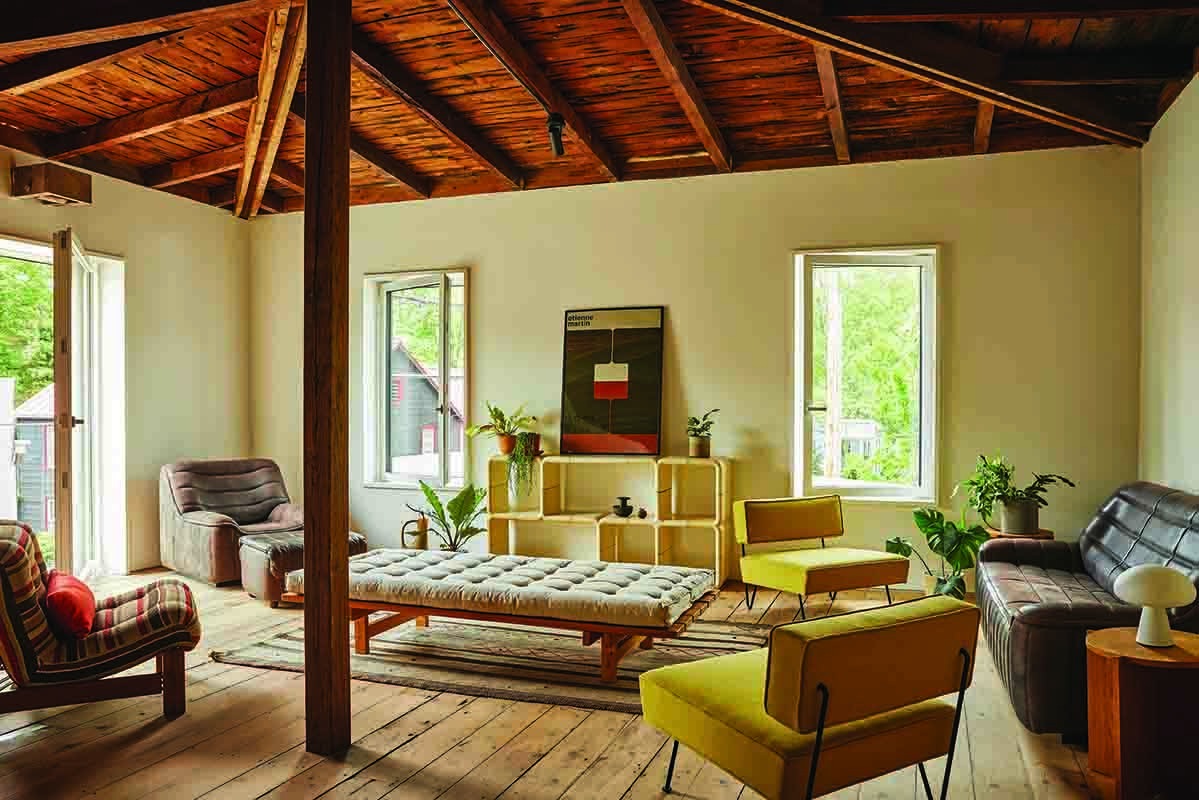
When North River Architecture purchased an 1840s brick storefront in Stone Ridge in 2023 and set about renovating, they wanted to provide more than office space. The firm’s newly debuted 4,400-square-foot flagship office, now called the Electric House, is also membership-based, multiuse coworking, community, events, and education space with a variety of flexible workspaces, including two 900-square-foot presentation rooms, four rentable conference rooms, and an enclosed garden for gatherings. But there’s also a showroom which explains and promotes the benefits of all-electric housing.
For almost a decade, the design-build firm has worked exclusively on all-electric buildings. The net-zero Electric House serves as proof of concept, so well-designed and insulated that it affordably produces more energy than it uses on an annual basis. “North River plans to showcase Electric House as a way to educate clients and the general public about the dramatic recent change in the industry,” says Peter Reynolds, North River partner and design director. “Electrification of all new homes has become a cost savings, rather than an ethical burden and is the next wave in promoting carbon-neutral futures.”
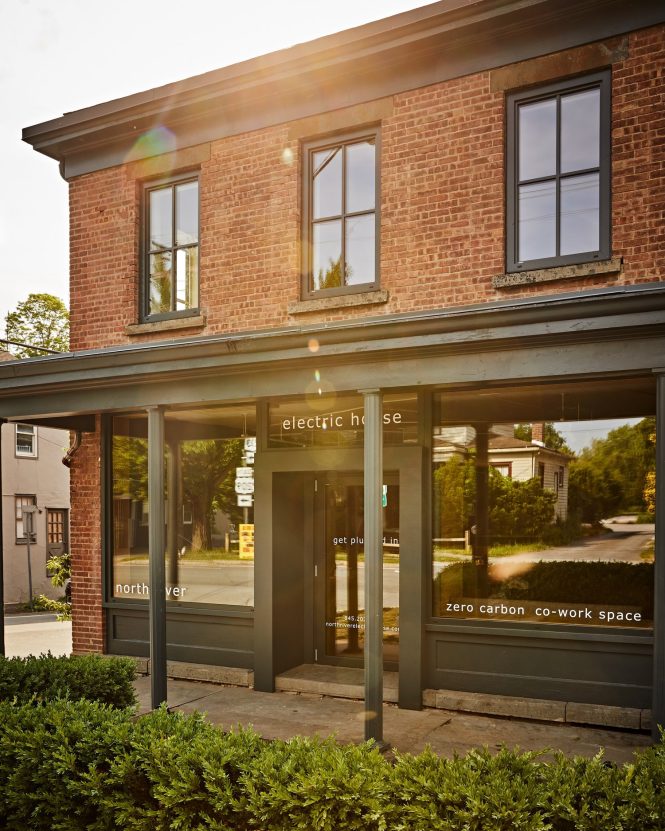
North River’s Electric House is on Main Street in Stone Ridge’s historic district. Photo by Christian Harder
The aim is to help increase community literacy about recent industry changes as well as convening sustainability-minded professionals under one roof. “There’s going to be a permanent exhibition for people to come in and educate themselves, to understand it right away,” says Reynolds. “We’re going to have community-based programming around it. We’re going to do everything we can in the region and connect with everybody who’s talking about electrification.”
Electricity was not always deemed the most energy-efficient way to power a home, but the declining costs of renewable energy sources such as solar and wind power have made it much cheaper. Reynolds hopes the center will help both buyers and builders see how simple it is to follow their new motto and “Electrify!”—whether building a new home or renovating an older one.
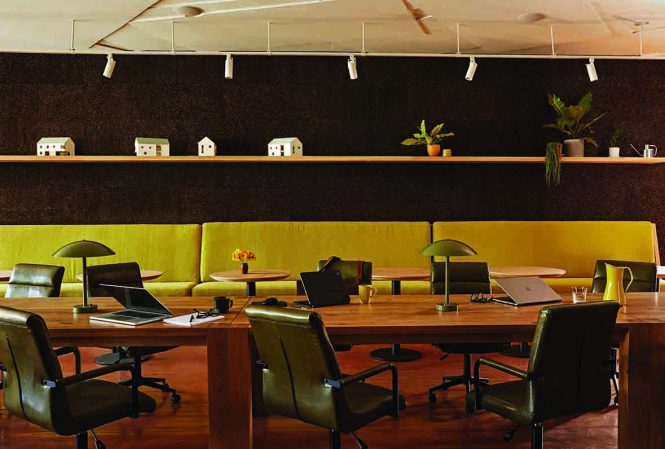
The Electric House offers presentation rooms and coworking spaces, with flexible monthly membership plans. Photo by Christian Harder
“Electricity is the byproduct for renewable energy now,” says Reynolds. “So specifically in the construction and housing industry, the cost difference between producing a net-zero energy house and a regular code house has gotten so small that it’s all we do. There’s just no other way to go anymore.”
There’s a lot of jargon associated with sustainable construction, which North River would like to avoid. “Electrify!’ was chosen as the company’s new motto because it’s easy to understand.
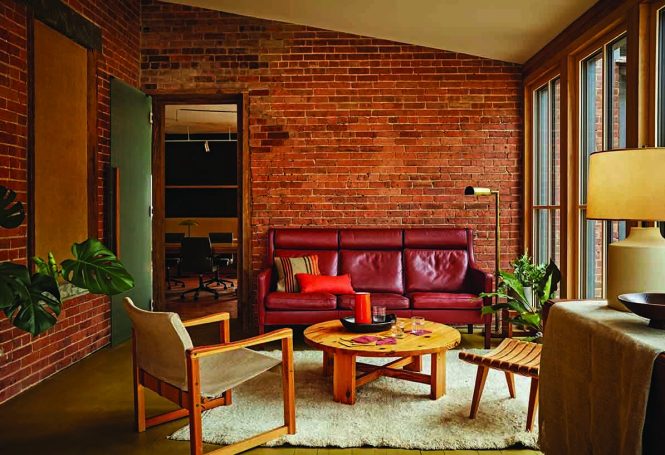
The sunroom library at the Electric House. Photo by Christian Harder
“Everybody knows what it is,” says Reynolds. “Rural electrification was a big thing in the ‘30s, ‘40s and ‘50s. It’s back now—in a different way, in a big way, and there’s a consensus across the whole country. Electrification is really what’s happening and needs to happen across the country.”
Constructing an all-electric house previously cost 20 to 25 percent more, but that’s no longer necessarily the case. That’s a positive development since the higher price tag was a barrier to entry, causing some homeowners to hesitate, worrying they would never get their investment back.
“And it was only for electricity,” says Reynolds of past electrification efforts. “It wasn’t for heating. It just was sort of a do-gooder thing. Now the technology has made it so much easier. Every builder can do it. They just don’t know about it. They can take a workshop or come by. We train builders. If you hire us as an architect and you have your brother as a builder, we’ll train them. That’s how easy it is.”

One of the adaptable upstairs spaces at the Electric House. Photo by Christian Harder
Reynolds figures a new all-electric house now costs only about 7 percent more to build. Renovations of older homes might be more, depending on the building’s complexity. “Our real contribution to the market here is that we’ve reduced the cost difference between a regular code house and a net-zero energy, super-efficient house,” says Reynolds.
While it may be simpler to incorporate the all-electric approach in new construction, retrofitting an older building needn’t break the budget, as their new office demonstrates. “To get to a really efficient house, where producing energy with electricity makes sense, you need a continuous blanket of insulation,” says Reynolds. “Continuous is key.”
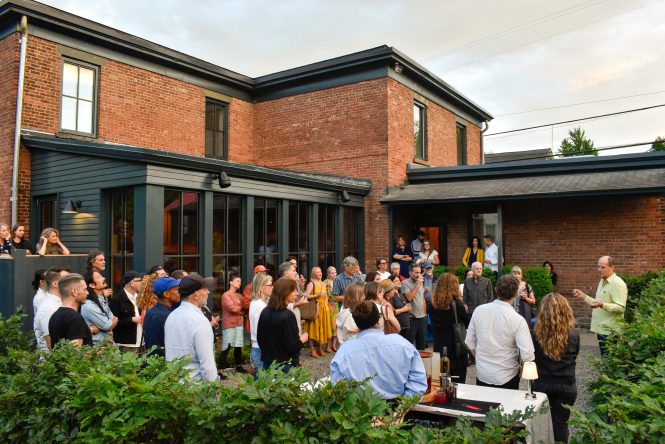
The enclosed courtyard offers a place for people to mingle. Photo by Seth Davis
The upgrade of Electric House involved the removal of existing walls so the building could receive layers of eco-friendly insulation. The focus was on air tightness. “We put 12 inches of rigid insulation on top of the existing roof,” says Reynolds. “This was a relatively easy building to do because it’s one of those low-pitched buildings. We put our solar right on that roof and it’s in a historic district. We saw it as a great candidate to show you can work within historic preservation limits.”
And the Electric House won’t waste any energy informing the public about the benefits of the all-electric home. No fossil fuel is used in the building and there’s no carbon footprint. Memberships have an annual fee of $50, which includes one drop-in day and access to all the Electric House’s educational events and programming. A range of adaptable, monthly coworking plans can be purchased on top. For now, the Electric House events are limited to the current Enchanted Lion Books pop-Up, which runs through August 31 with multiple storytime hours slated, though more is on the horizon.
